Business at Biketown, Portland’s electric bike share program, is booming. Since rolling out its electric bikes in 2020, the service has expanded across the Portland area, and June 2022 was the highest ridership month in its history, with 50% more rides than the same period last year.
Biketown’s diverse base of users can be attributed to this expansion. So too can the Biketown for All program, which gives people who qualify for low-income government programs like SNAP free ride credits. As we’ve pointed out, high gas prices may also be encouraging people to ride the bikes. These are all good things – we want as many people on bikes as possible!
Unfortunately, it appears the program is having trouble keeping up with demand.
“Bikes parked away from stations are significant operationally. They add to time and effort needed to replenish the stations.”
– Dylan Rivera, PBOT
The last time Biketown added more bikes to its fleet was in 2020 when it went from having a fleet of 1,000 regular bikes to 1,500 e-bikes. Gauging from the empty bike docking stations around the city, however, 1,500 is no longer enough, especially now that the service area has expanded.
Even if there is a bike or two parked at a station, there’s no guarantee it will be charged. And if you’re with a group, good luck. Finding one charged bike is hard enough, but finding two or three near each other can seem an impossible feat.
While biking near SE Division and 34th Avenue the other day, I noticed a couple standing at the Biketown station looking confused. Neither of the two bikes parked at the station were functional, although they were showing up as available on the app. The nearest bike was half a mile away on Hawthorne, and it was hot outside. They told me they didn’t have anywhere they needed to be – they just wanted to try out the bikes they’d heard so much about. This could’ve been a chance for two people to learn how fun and useful electric bikes can be, but since they couldn’t find one to ride, they decided to skip it.
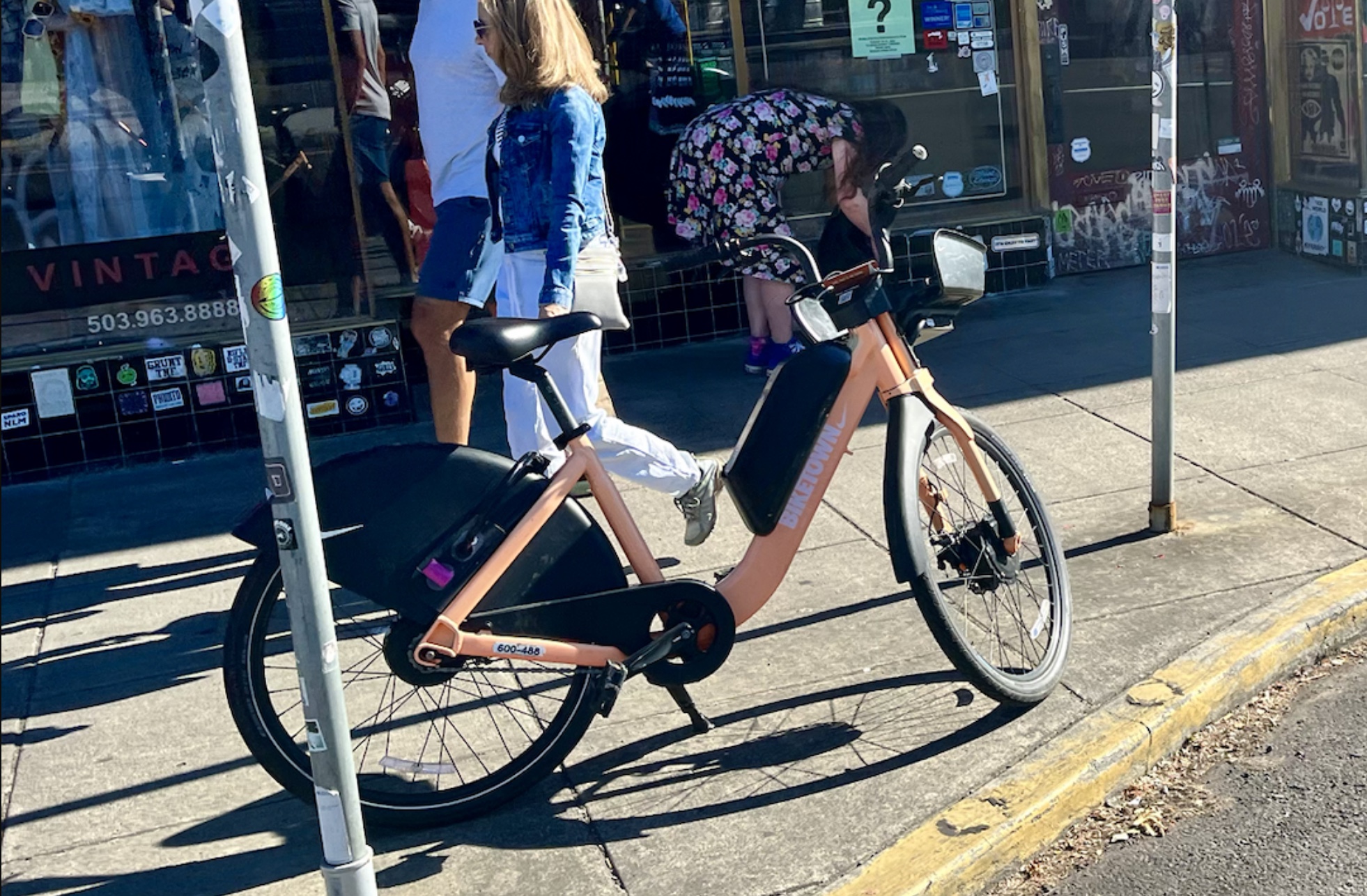
I took to Twitter to see if more people had stories to share about their recent Biketown disappointments, and received many disheartening replies.
“I had several friends visit Portland and they couldn’t find five bikes relatively close to the restaurant we met at for lunch so they chose to drive instead,” said Portlander Nick Hodge.
Stories like these are concerning to advocates. A great bikeshare system could be a real game changer for getting people out of their cars. An inadequate one could push people even further into car dependency.
Transportation advocate Tony Jordan, who said he has trouble finding a charged bike near where he lives in Sunnyside, told me via Twitter that while he loves Biketown, he now hesitates to recommend it to people who aren’t already carfree.
“If they have a bad experience, they’ll give up forever,” Jordan said.
Dylan Rivera, Public Information Officer at Portland Bureau of Transportation, said although the trouble people are having with Biketown is real, the program isn’t planning on expanding its fleet in the near future. He attributed the trouble people are having with Biketown to its surge in popularity, along with the fact that people don’t always return bikes to stations, instead parking them in a more convenient location and eating the $1 out-of-station fee.
According to Rivera, 45% of all Biketown trips are ending outside stations, and it’s straining the program.
According to PBOT, 45% of all Biketown trips are ending outside stations, and it’s straining the program.
“The option of parking outside of a station is a super convenient feature of our system,” Rivera said. “But bikes parked away from stations are significant operationally. They add to time and effort needed to replenish the stations, and therefore add to the operational cost of the system.”
I have been guilty of locking Biketown bikes to any old bike rack, and I think it’s reasonable you’d want to do this – the $1 fee doesn’t seem so bad if you’re in a hurry and you can’t find a station right by your destination, or you just don’t want to walk from a station in the heat. But though I wouldn’t shame someone else for doing it, I’ll think twice about parking outside a station now.
I’ve seen the wonders of Biketown in action. When my mom came to visit me in April, I felt completely comfortable knowing we could get around the city without renting a car because of this service. We rode bikes from the Alberta area to Richmond to downtown, and it was easy, convenient and fun.
But Biketown’s fickleness is most impactful for people the organization set out to help with the Biketown for All program. People who rely on public transportation have been unable to depend on TriMet during its bus driver shortage – and now the service intended to mitigate the impacts of inequitable transportation planning is leaving people hanging as well.
It’s unclear if Biketown will impose harsher penalties on people who park outside of stations, or if they have a plan for dealing with this problem at all.
The politics in Portland when the system was first funded required elected officials to promise that “no public money” would be spent on it. But that was then, and this is now: Biketown is a successful public transit service that deserves to be funded as such. We cannot and should not continue to starve this system — especially while Portland’s car use rates skyrocket and transit service plummets.
When the program first switched to electric bikes almost two years ago, the city planned to have a fleet of 4,000 by 2024. Hopefully we’ll see more orange bikes around the city sooner than that.



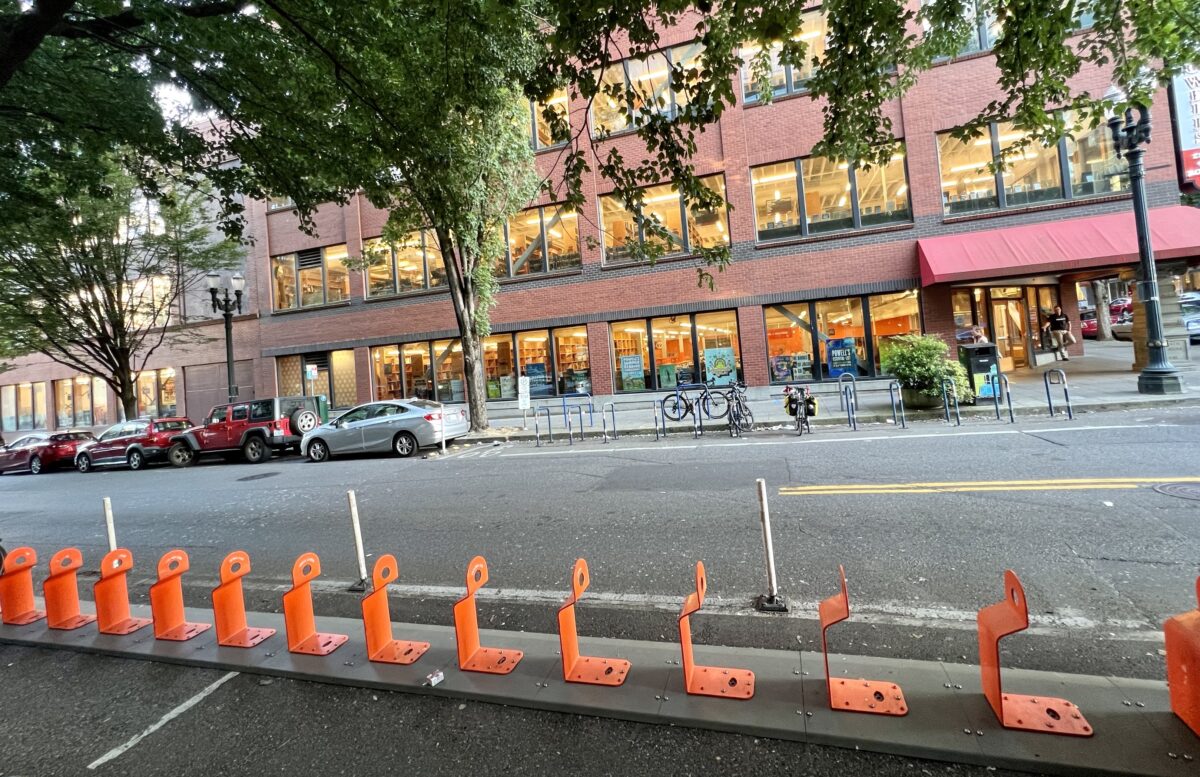
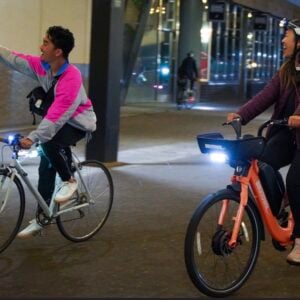
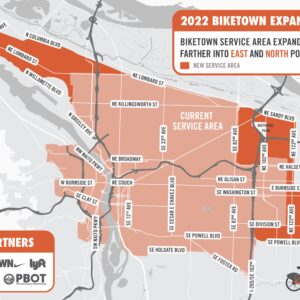
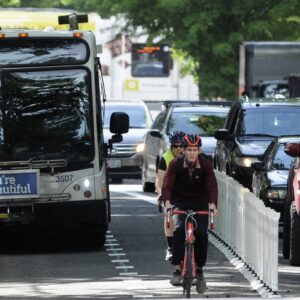

Thanks for reading.
BikePortland has served this community with independent community journalism since 2005. We rely on subscriptions from readers like you to survive. Your financial support is vital in keeping this valuable resource alive and well.
Please subscribe today to strengthen and expand our work.
Wonder if pricing and/or tech is a barrier as well?
Was walking behind a person who was taking back cans on a very hot afternoon. A Biketown bike was parked on the sidewalk and he went to go use it but couldn’t so he walked on carrying his load.
Would be interesting if you could feed quarters into a bike and use it if that’d help get more people using bikes as an alternative to driving.
I wonder what the price elasticity is for the non-docking fee. At $1 there is a 55% return rate. What would the return rate be at $2? Or $3? And so on. Maybe raise the rate in popular areas and keep it low in poorer parts of town?
I really like the idea of doing some experiments around pricing. If only 55% of bikes are being returned to a station then something isn’t working (though I also don’t recall what the rate was previously) and it could be price or the stations could be poorly sited or perhaps not enough of them in certain areas. While looking at differences in geography could be useful I would be in favor of focusing more of this in areas with higher populations signed up for Biketown for All as having these bikes more reliably at stations is going to have a bigger impact on people who we are trying to incentivize to use this system.
They already increased it from $0 for members in 2020. Given that Biketown 2.0 is already more expensive than using TriMet for all but the very shortest of trips, I really don’t think further increasing the price is the direction we need to be going in.
This is real! I live in Woodstock/Mt. Scott area and there are no docking stations around. Scooters/bikes always end up being more than a bus, and there are more bus stops nearby (although service cuts have been rough on some routes, especially on weekends). These aren’t really solving that “last mile problem” if it costs an extra $1 to park them in the last mile areas.
I’m not suggesting raising the per-use price, I’m instead suggesting raising the price for not properly returning the bikes. Obviously $1 is too little with 45% of users abusing the system, and the money being raised at the moment is unable to adequately fund the current system. Prices will need to rise at some point.
As for public transit, why not raise the basic round trip price to say $10? Might this likely get rid of a lot of the security issues on TriMet? TriMet already has a reduced fare program for the least well off, so there shouldn’t be the usual equity backlash. Any legitimate user would I think be willing to pay the increased fare in return for secure rides and illegitimate users would think twice about moving to Portland.
Raising fares to $10 would get rid of the security issues and the rider issues. It would be far easier for TriMet to find sufficient drivers to handle no riders.
Quick thinking, sir!
An alternative to price increase, or perhaps in conjunction with it, is to create virtual docks at/near to common places bikes are left un-docked. Infrastructure for increasing the number of docks may be prohibitively expensive, but if virtual hubs can centralize where bikes are being left it makes them more easily accessed by both customers and support crew. PACE used this model of virtual docks quite successfully on the CSU campus in Fort Collins CO when faced with a similar issue.
I’ve been finding returnable glass milk bottles with a $2.00 deposit in recycling bins so maybe a $2.00 fee is not too much. Maybe a trip that starts off-station should be free if the bike is returned to a station? That would be a good incentive for single users to catch a bike and corral it.
It’s crazy that so much space is dedicated to orange bikes and it sits mostly empty. It makes the program seem disused. I’m guessing that workers go out prepared to switch out batteries, check tires, etc, so they are less able to move bikes around.
First, great article Taylor! I have also noticed that the bike racks have been consistently empty or near empty around downtown lately but hadn’t thought much about it since I don’t rely on them. Interestingly, in the past week at my work’s townhall meeting there were people expressing interest in being able to apply their transit benefits (currently restricted to Trimet services only) to Biketown. If they can’t consistently keep bikes available, it could threaten this cultural change to more bike ridership.
The answer, of course, is that we expanded the territory before getting sufficient quantity of bikes to support it. People were saying this when the expansion was announced. We have one of the lowest bike density levels of any bikeshare system. We need at least 3,000 bikes to cover the territory that is now available.
One other suggestion. If the goal is to get these bikes back to racks, provide a carrot and a stick: keep the $1 penalty for parking outside of a rack, but provide a $1 incentive if you grab a bike from outside a rack and return it to a rack.
We’ve expanded the system to address equity issues. We’ve also not invested in the system to address equity issues. When major funding was first being fought for for bike share, a coalition of advocacy groups argued that because the system (at the time) didn’t reach far enough outside the central city it would not be fair to invest in it when so many other needs were still unfunded. So the city has expanded the system to those areas, but has still never figured out the politics to get the funding right. It’s another frustrating illustration of PBOT’s inability to message and organize around cycling and race/equity issues.
Improving equity by bringing everyone down is only an improvement on paper. The real gains are when we bring everyone up.
Yes, pay people to pick up stranded bikes like they used to!
I’m surprised to not see a bike bounty credit system for returning non-station bikes to a station. Other bike share systems seem to provide that incentive…
https://socialbicycles.zendesk.com/hc/en-us/articles/201117289-Out-of-Hub-Fees
That combined with a higher non-station fee might address the balancing issue.
The bike functionality and charge level info seems like a tech issue… works great in theory but in practice has challenges.
Thank you for writing about this, Biketown is one of those things I see every now and then but being in SW it’s not accessible. I’m not surprised that City Council isn’t doing anything about that public funds restriction. When I mentioned it to them a couple weeks ago they did not seem taken aback by the statement, or my encouragement to remove it.
At the end of the day, without more bikes, continuing to expand the service area just dilutes the benefit for everyone.
I stopped using biketown when it became unreliable. I planned to use it to get froma station near my office to a meeting downtown. Despite showing multiple bikes as available, none of them was functional. Tourists seem to enjoy them, but I do not see them a valuable part of our transit system at this point.
Over here in Bend, same situation. You see the bikes parked all over town, randomly in front of houses, parks, etc etc For a city this size, we have a fairly robust system, but it looks like the users are not very responsible. Known problem by the City, but not sure they have a solution.
I have seen a few parked out on the Springwater, and locked up in random spots. They have no tricycles, so I haven’t ridden one. Do they just stop when your ride is over, like I hear the scooters do? (which I have also never ridden, because they all have two wheels, and require balance.)
I just noticed that Bike Angels is available in the app, which rewards you for bringing bikes back to docks.
I’m not seeing that. Which section do you have to be under to see that mode?
Looks like it’s only if you have a Biketown for All membership: https://biketownpdx.com/pricing/biketown-for-all
I’d love to see Biketown succeed. However, I wonder if the public will support the type of ongoing subsidies it would take to make that happen.
As has already been stated, availability is huge. Most people won’t take a transportation option if they have significant doubts it will be available for the return trip. Likewise, they won’t take a bike if they have to walk too far to get to one as it defeats the purpose.
Cost is also a significant issue. On a per mile basis, ebike is a particularly expensive way to get around even if there’s no way the docking fee comes close to covering costs and that the overall price is low when you consider what it really takes to keep a fleet maintained and balanced.
Overall, it’s an unreliable and expensive way to cover distances you can cover on foot free.
People value their time. I can get downtown on a Biketown bike in 15 minutes (walking to find a random bike outside of a dock in my neighborhood about 5 mins, 10-15 mins riding). $3.00 – $4.00
Walking to MAX/Bus (5-10 mins) + waiting for Trimet (0-10 mins) + (15 mins travel time). $2.50
Walking downtown would be 50 mins – Free
I’ll spend the $3.00 every time. Half the travel time of Trimet for roughly the same price. Walking isn’t even comparable except for the shortest of trips.
You’re not figuring energy expenditure.
Your calculation and general logic sounds about eight, though you also have to make it back doubling the cost — assuming only a single out and back.
So I agree with everything you said, though find the cost per mile exorbitant. Happily my personal bike is fast and cheap, and jogging is a great way to cover more ground than people would expect
If one of the biggest problems is folks ending rides outside of stations, restoring the $1 credit “bike bounty” for returning bikes to stations seems like a no-brainer. It’s a software change, no new infrastructure necessary.
In the pre-ebike Biketown days I almost always started rides outside of stations ending them inside to subsidize my rides (sometimes I’d even come out ahead!), but now I never do that, just on principle.
Commoditization of the public right of way:
In order for bikeshare to work, it has to be cheaper than public transit, which in turn must be cheaper and more efficient than driving to work. As long as driving to work continues to be easier and cheaper, both alternatives will fail no matter how cheaply we price them, even if they are “free” and utterly convenient. So we need to make driving harder, more expensive, and less easier to park. We have two main methods for doing this: We can either heavily regulate our streets, which we’ve been doing now for over a century and utterly failing to get the results we want; or we can use market mechanisms to do so, which we’ve so far only done in a half-assed way.
I can’t remember the year, 2013 maybe, but I sat as an interviewer on an interview panel for the top six candidates for PBOT director. We ultimately hired Leah Treat, but one of the other candidates urged us to consider commoditizing the public right of way as a way to both raise a reliable stream of transportation revenue AND to do all the socially responsible things that we strive to do. What he meant was that we should designate what parts of our street is for “free” use by anyone, for example sidewalks, bike lanes, alleyways, traffic lanes, and center turn lanes; and what portion can be rented or restricted, such as parking, loading zones, taxi zones, and bus/MAX (Rose) lanes. The “free” zones are already being paid for with our taxes, various fees, and so on. We pay quite a lot once you factor in sewage and water fees, property taxes, fees to the cable company to pay for their costs of the utility license fee (ULF), shipping rates, gas taxes, our federal income taxes, and on and on. It’s only downtown and in nearby neighborhoods that we even attempt to charge for parking through pay stations, parking meters, and permits – most of the city has no direct parking charges whatsoever.
Who uses our streets as a commodity? Well, we all do of course, we drive on it, ride on it, walk along it, use public transit, bikeshare, Lyft/Uber, and so on. We also get our water and send back our sewage under it, plus get a lot of other utilities. Our cell phone signals are sent along it. But there are others who are totally dependent on having an unlimited free supply of public right of way – not just cell providers – but also delivery companies, public transit, take out, emergency services, prostitutes and street walkers, food trucks, homeless campers, various eateries, drug dealers, folks fixing their car (for the last indefinite period), moving PODS, and many many others.
This fellow we were interviewing suggested that the city price the street and put the parking and loading space “use” (not the land) on the open market, and as various users bid on the price at different locations, PBOT would collect a percentage of those bid prices and regulate the terms of use (time, legality of use, and so on) with the winning bidders. Of course there would be various secondary and tertiary markets that PBOT would be unable to control, as well as derivative markets of rights of use, but the upshot would be that car parking would effectively no longer be free. It could even incentivize a secondary market for commercial bike parking that really is secure and I suppose homeless campers who might have a secure rental agreement with the city. Who knows?
David…yes good memory and “what if”…so I am curious who this period was AND if they did implement such a policy in another city in the last 9 years? Would be curious.
https://bikeportland.org/2013/05/23/choosing-a-new-pbot-director-87186
Todd, Thank you for the link. I was part of the process of reducing the final 6 to the final 3 and told explicitly to not show up at the event JM attended. Along with #2 Treat, #1 on our list was an industry insider engineer from North Carolina (long before I even thought of moving there) who made the right of way suggestions above, and the at-the-time Wisconsin state DOT director who didn’t like his governor (Walker) and thought Portland would be a better fit for his African-American family than Madison. The people we ultimately rejected was an ODOT manager, one of the nicest people you could ever hope to meet, and 2 very competent senior supervisors at PBOT who are still there. We were fully convinced that any of the top 3 would have benefited the city, but for different reasons. The top guy was given an offer and turned the mayor down, so he asked #2 on our ranked list and Leah Treat accepted the offer.
No, I have no idea if the bid-rent process has ever been used systematically in the USA or anywhere else for that matter to regulate parking spaces. We use it regularly on “private” land, which technically it isn’t since governments regularly use right-of-way to both deliver services and to deny services to people’s properties.
The other factors “behind the scenes” that may be impacting BIKETOWN, since these are ripping through other shared bikes and scooter systems in the US: the bumpy unstable modem software update to LTE from 3G (each older Biketown bike needs a new modem? I assume the e-bikes were LTE when new), parts supply chain, and basic labor, traffic congestion impacting rebalancing access…
The use of a reward / Bike Angel option is a no brainer as other sister Lyft systems have this feature in the App already (BayWheels etc.)
Letting people park wherever they want is a great idea in theory, but it hurts the reliability of the system overall. It would be similar to letting bus riders get off at any block they choose rather than at designated bus stops. Yes people have to walk a little further, but they’ll be more inclined to use a bus service that is more streamlined and on-time. When I lived in Washington, DC years ago, I lived across the street from a bikeshare station. There, all bikes had to be docked at stations. The swiftness with which bikeshare workers would load the bikes into vans to redistribute them was impressive. There should be little confusion as to why a system like that functions far better overall than a system that lets people park wherever.
Follow-up thought: Let Jarrett Walker, author of Human Transit, design the entire bikeshare system. In under a week I’m sure he could create a system that would either pay for itself or attract heavy funding. It would also work far better than the current system on every front, perhaps even equity.
Back when Biketown paid a $1 bounty to return out-of-hub bikes to a station, I did it a lot. Even if a hub was close, I made it a point to find a nearby “stray” bike when I needed one, and parked it at a hub at the end of my trip. Cut down on my cost of using the system,
No more. I have zero incentive to make the extra effort.
Pedal bikes don’t need to be charged (just sayin’). NYC still offers standard bikes in addition to ebikes in their program.
Taylor: don’t feel “guilty” for locking at a regular rack; It’s a fee for your convenience, not a fine for bad behavior!
If Biketown wants to get more bikes in hubs more of the time, they could raise the fee to $2 or $3, and offer riders who deliver bikes from Out-of-Hub (OoH) back into hubs a $1 credit.
We recently raised the fee for OoH in Eugene from $1 to $2 in Fall ‘21. It only reduced trips which ended OoH by about 5%, but the additional revenue helps pay for the time our team spends collecting OoH bikes and delivering them to hubs.
Gee, you think our houseless friend may be leaving them anywhere?
Guess, the truth don’t fly around here.